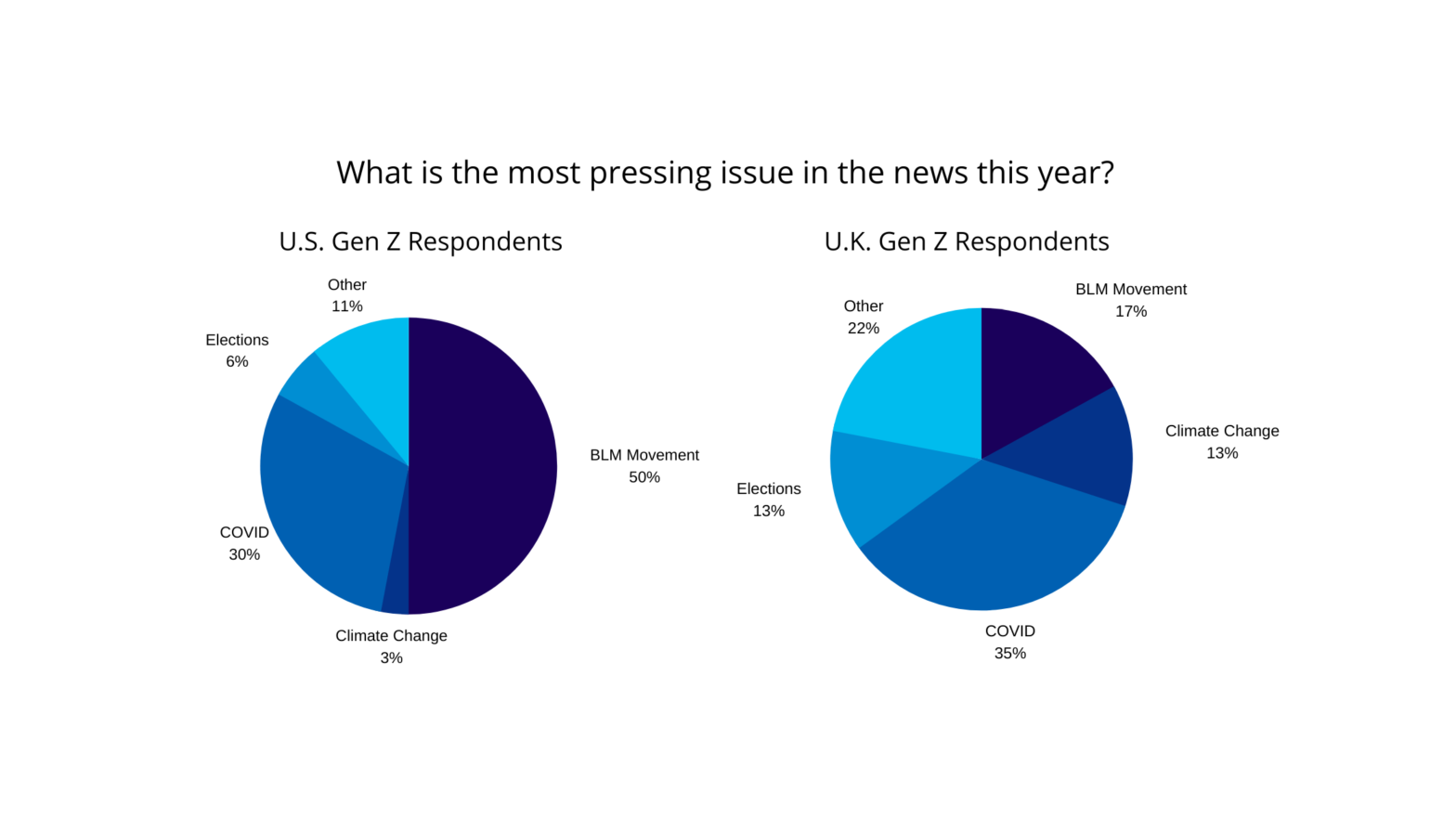Armed with tweets and Tiktoks, the enigmatic Generation Z has proven anything but indifferent to the political climate. Recent years have seen “Zoomers” grappling the mic on issues ranging from gun control to climate justice, and videos of high school students facing off against incumbent senators at town halls have gone viral. Given this generation’s unique relationship with digital media, The Factual partnered with Political Youth, a U.K.-based platform for civic-minded teens, to investigate the implications of Gen Z’s heavy media reliance and perform a transatlantic comparison of their news consumption habits.
Who is Gen Z?
Generation Z is defined by the Pew Research Center as anyone born between 1997 and 2012. Succeeding millennials and preceding Gen Alpha, Gen-Zers comprise the largest and most ethnically-diverse generation in American history, approximately 27% of the U.S. population. Unlike millennials, Zoomers are digital natives with no recollection of the pre-internet age.
Widespread stereotypes, held especially by older generations, portray Zoomers as hyper-emotional social justice warriors and internet addicts. Vigilant marketers tailor their content to a social media-glued demographic that “takes in information instantaneously and loses interest just as fast.” Yet, experts studying Zoomers describe them as “clear-eyed, economic pragmatists” who “play small, shelve their dreams, and look down.” So, what’s the verdict? Are Zoomers conscientious and rational, or naive and ill-informed? And if it is the latter, does Gen Z’s high media exposure warrant concern that youth are more prone to absorbing biased news?
Our survey results suggest that the majority of Gen-Zers in our U.S. sample are conscious news patrons: of the 305 respondents, the average Zoomer reported that, on a scale of 1 (low trust) to 10 (high trust), they would rate their confidence in mainstream media (MSM) at a 3. This result echoes findings from the Knight Foundation’s 2017 survey on Trust, Media, and Democracy, which found that the average American (aged 18+) scored a 37 on a 1-100 media trust scale. As to why faith in MSM is so low, this may be due to the modern infodemic making it harder for citizens to cut through bias, sort out facts, and feel well-informed.
Furthermore, when asked to rate how comfortable they feel discussing the news with other people their age, the average Gen-Zer responded an 8, indicating a high degree of open-mindedness to civil discourse. Unsurprisingly, the digital generation overwhelmingly reported receiving their news from social media and news apps, citing Twitter and the New York Times as their go-tos. Finally, we asked what they thought is the most pressing issue in the current news cycle. The most common answer was Black Lives Matter, followed by Coronavirus, the Yemen crisis, and elections.
Recent research and news reports are starting to pick up on the political implications of Gen Z’s social media overhaul. According to Millennial Marketing, Gen Z leads Twitter usage at 45% and Instagram usage at 63%. “Hashtag activism” has surged with Zoomer domination: on May 28 this year, Twitter told the New York Times that more than 8 million #BlackLivesMatter tweets were posted on the platform; by contrast, the hashtag peaked at 146,000 tweets in December 2014. A recent Forbes article explores how Zoomers have harnessed TikTok and Instagram as tools for online organizing in tandem with physical protests. For example, Facebook reported that on June 2 about 28 million people posted plain black squares on Instagram in recognition of #BlackoutTuesday.
Meanwhile, Political Youth ran an identical poll, and the results were similar. Collecting 130 responses from U.K. youth, the survey found reports of low trust in mainstream media (3 on a 1-10 scale) and high comfort (~7.5 on a scale of 1-10) discussing the news with fellow Zoomers. One notable difference: half of the respondents indicated digital articles as their main news source, suggesting that U.K. Gen Zers are less dependent on social media for news than their U.S. counterparts. The most pressing news topic? Coronavirus, followed by Black Lives Matter and climate change.

%20(4)-2.png) While the sample set for our micro-study is not necessarily representative of the entire generation, it suggests that, contrary to Gen Z’s reputation as easily influenceable, they are a curious and engaged cohort that is far from oblivious of the media that they consume. Although the New York Times remains the most popular source in the U.S. overall, many respondents said they cross-check multiple news outlets, including NPR, BBC, and Politico. While these are traditionally left-leaning outlets, each rank highly in our credibility rating system. High skepticism in mainstream media suggests that the generation inundated with information does not process it unfiltered. Most importantly, their willingness to discuss news with peers portends that Zoomers may very well constitute a new political guard capable of bridging hyperpolarized divides. As Gen Z begins to occupy a greater space in national political discourse, it is important to give young people credit where it’s due.
While the sample set for our micro-study is not necessarily representative of the entire generation, it suggests that, contrary to Gen Z’s reputation as easily influenceable, they are a curious and engaged cohort that is far from oblivious of the media that they consume. Although the New York Times remains the most popular source in the U.S. overall, many respondents said they cross-check multiple news outlets, including NPR, BBC, and Politico. While these are traditionally left-leaning outlets, each rank highly in our credibility rating system. High skepticism in mainstream media suggests that the generation inundated with information does not process it unfiltered. Most importantly, their willingness to discuss news with peers portends that Zoomers may very well constitute a new political guard capable of bridging hyperpolarized divides. As Gen Z begins to occupy a greater space in national political discourse, it is important to give young people credit where it’s due.

